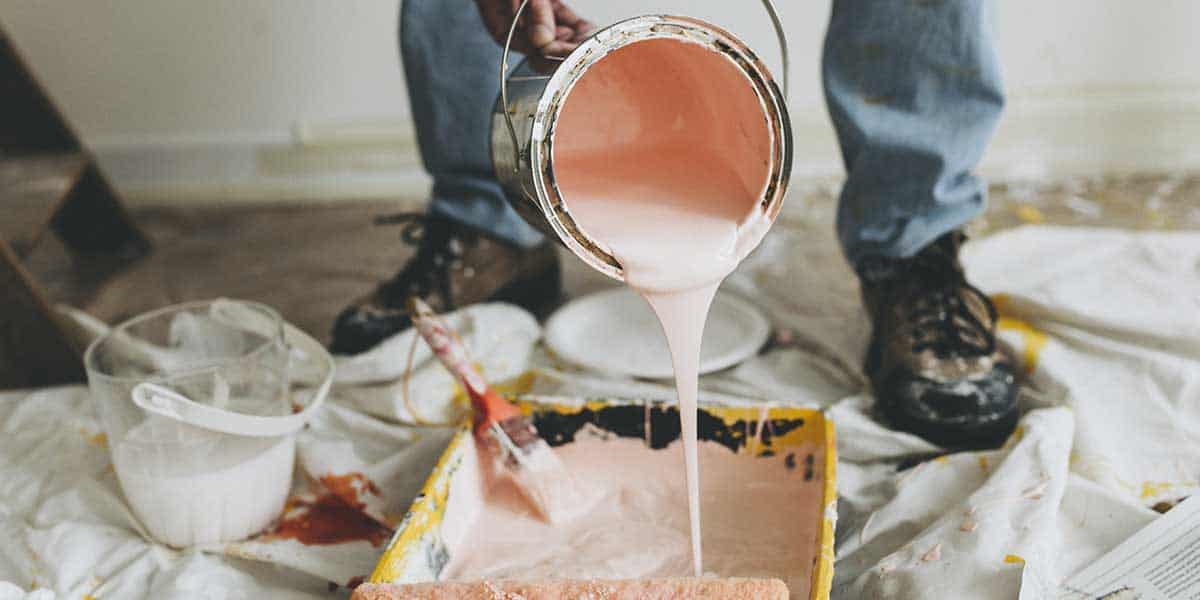
When it comes time to plan your next interior painting project, it makes sense to take a look at the paint you already have and see what you can use. But are all types of paint suitable for interior use? Specifically, can you use exterior paint for interior walls?
The answer is generally no, and for good reason. Exterior paint isn’t safe to use indoors. It also doesn’t have the properties needed to keep your interior walls scuff-free and flawless for many years.
Here’s what you need to know about using exterior paint indoors, from professional painters in Las Cruces, NM.
Paint is paint, right? Not exactly. Exterior and interior paints are very different. Using one in place of the other won’t provide the same properties and benefits necessary for that environment.
Exterior paints are formulated specifically to withstand the outdoors. They use special formulas that allow them to expand and contract as outdoor temperatures fluctuate. They are also able to withstand rain, sleet, snow, hail, UV rays, and other weather elements.
To gain these properties, exterior paint uses additives that are not included in interior paint. These additives can be harmful to inhale, which is why they are not used in interior paint, which is applied in confined spaces with little ventilation.
Meanwhile, interior paint is formulated to withstand scuffs, scratches, bumps, and everyday life activities. It’s easy to wipe down and clean, and it dries relatively quickly. It also resists yellowing, fading, and staining.
Can you use exterior paint for interior spaces? You may assume that while exterior paint doesn’t have exactly the same properties as interior paint, it should do just fine on your walls. In reality, using exterior paint inside could be dangerous.
These are a few significant reasons you shouldn’t use exterior paint indoors.
One of the biggest reasons not to use exterior paint inside is that it can be toxic when used in enclosed spaces.
Exterior paint contains volatile organic compounds (VOCs), which are hazardous to inhale. As the paint dries, it releases these VOCs into the air. This isn’t a major concern when the paint is used outdoors as intended, as your family probably won’t be breathing it in while it dries. But when you use exterior paint inside, you’ll inevitably inhale these harmful gases, putting you at risk of health concerns.
Consistent proximity to VOCs can cause adverse health effects such as:
These compounds can also impact your pets’ health. VOCs have been known to cause cancer in animals, among other health concerns.
When you use exterior paint inside, you risk inhaling VOCs while the paint dries and any time you use the space. This paint can continue emitting harmful gases and affecting the indoor air quality after it has cured.
The VOC levels in exterior paint are relatively high. Thankfully, indoor paints rarely contain VOCs. This is why it is much safer to use paint intended for indoor use inside, as it has been formulated and tested for safety in enclosed spaces.
Even if you have an exterior paint with low VOC levels, you probably won’t want to use it indoors for other reasons. A big one is that outside paint isn’t formulated for indoor use, which means it won’t create as neat of a finish on your walls.
Exterior paint isn’t designed to withstand scuffs and dings like interior paint is. If you ever move the furniture around in the room and scuff the wall, or knock into it with the vacuum, you’ll likely chip the paint.
Outside paint also has a longer drying time than indoor. It goes on thick and can sometimes take up to a full month to cure. This drying time works well for outdoor use, as the paint doesn’t encounter harsh impact the way it might inside.
For all the hazards exterior paint poses inside, it likely won’t even look nice on your walls. You’ll need to repaint within a few years to achieve a clean, uniform finish.
Interior paint is relatively easy to clean. You can wipe down the walls to remove stains and spills from the paint’s smooth surface.
In contrast, exterior paint isn’t designed for regular cleaning. It can withstand power washing, but a regular scrub with a sponge likely won’t do much to remove stains.
This means that when you use exterior paint for interior walls, it can quickly accumulate stains that you can only remove by painting over them.
If you have already painted interior walls with exterior paint, take a look at the brand and type of paint you used. Perform some research or contact professional painters to understand whether that type of paint is toxic to use indoors. If so, you’ll need to remove the paint and repaint the area with one rated for interior use.
In certain cases, it might be safe to use exterior paint indoors. If you’re painting a room that shares indoor and outdoor use, such as a sunroom or a shed, it might be okay. Talk to a professional painter about whether the paint you used was safe and your options for removing it, if necessary.
Instead of trying to determine whether you can use exterior paint for interior walls, enlist professional painting contractors to handle this task. Your painters will use the best and safest type of paint for the specific project, apply it neatly and evenly, and ensure long-lasting durability.
Engel Coatings Inc. is your professional painting company in Las Cruces, NM. Call us today at 575-642-5481 to request a free estimate.
